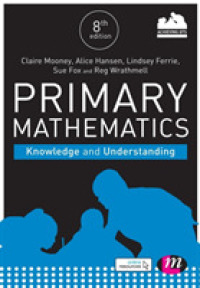Full Description
This volume's goal is to provide readers with up-to-date information on the research and theory of scientific text comprehension. It is widely acknowledged that the comprehension of science and technological artifacts is very difficult for both children and adults. The material is conceptually complex, there is very little background knowledge for most individuals, and the materials are often poorly written. Therefore, it is no surprise that students are turned off from learning science and technology. Given these challenges, it is important to design scientific text in a fashion that fits the cognitive constraints of the learner. The enterprise of textbook design needs to be effectively integrated with research in discourse processing, educational technology, and cognitive science. This book takes a major step in promoting such an integration.
This volume:
*provides an important integration of research and theory with theoretical, methodological, and educational applications;
*includes a number of chapters that cover how science text information affects mental representations and strategies;
*introduces important suggestions about how text design and new technologies can be thought of as pedagogical features; and
*establishes academic text taxonomies and a consensus of the criteria to organize inferences and other mental mechanisms.
Contents
Contents: Preface. A.C. Graesser, J.A. León, J. Otero, Introduction to the Psychology of Science Text Comprehension. Part I: The Functions, Contents, and Design of Science Texts.S.R. Goldman, G.L. Bisanz, Toward a Functional Analysis of Scientific Genres: Implications for Understanding and Learning Processes. M.J. Chambliss, The Characteristic of Well-Designed Science Textbooks. I. Martins, Visual Imagery in School Science Texts. S. Ohlsson, Generating and Understanding Qualitative Explanations. Part II: Basic Cognitive Representations and Processes in Text Comprehension.P. van den Broek, S. Virtue, M.G. Everson, Y. Tzeng, Y-C. Sung, Comprehension and Memory of Science Texts: Inferential Processes and the Construction of a Mental Representation. J.A. León, G.E. Peñalba, Understanding Causality and Temporal Sequence in Scientific Discourse. I. Tapiero, J. Otero, Situation Models as Retrieval Structures: Effects on the Global Coherence of Science Texts. P. Maury, O. Pérez, J.A. León, Predictive Inferences in Scientific and Technological Contexts. M. Elshout-Mohr, M. van Daalen-Kapteijns, Situated Regulation of Scientific Text Processing. Part III: Comprehension Monitoring.J. Dunlosky, K.A. Rawson, D.J. Hacker, Metacomprehension of Science Text: Investigating the Levels-of-Disruption Hypothesis. J. Otero, Noticing and Fixing Difficulties While Understanding Science Texts. H. van Oostendorp, Updating Mental Representations During Reading Scientific Text. Part IV: Coordinating Multiple Information Sources and Media.R.E. Mayer, Using Illustrations to Promote Constructivist Learning From Science Text. M. Hegarty, N.H. Narayanan, P. Freitas, Understanding Machines From Multimedia and Hypermedia Presentations. W. Schnotz, M. Bannert, T. Seufert, Toward an Integrative View of Text and Picture Comprehension: Visualization Effects on the Construction of Mental Models. J-F. Rouet, E. Vidal-Abarca, "Mining for Meaning:" Cognitive Effects of Inserted Questions in Learning From Scientific Text.








